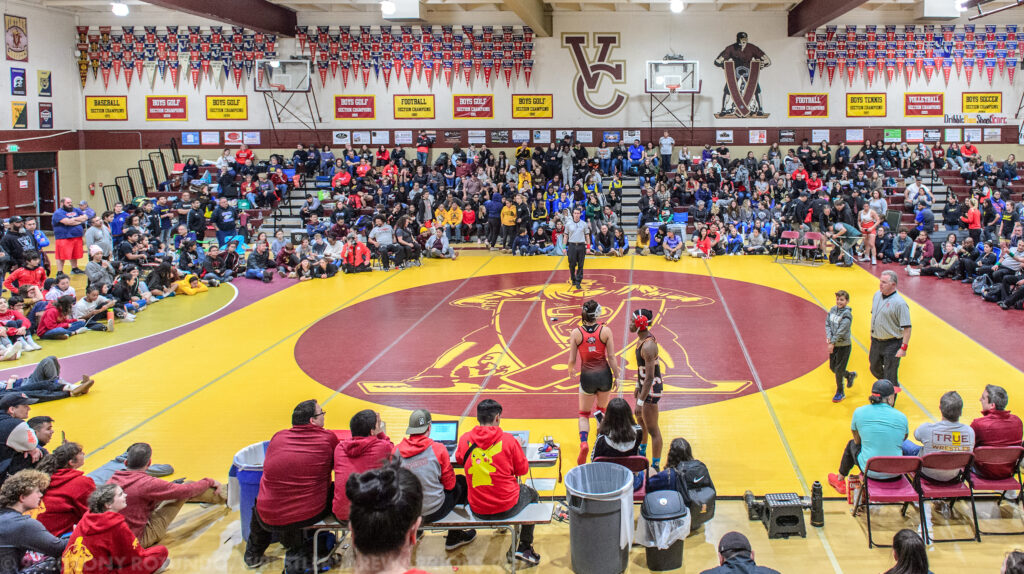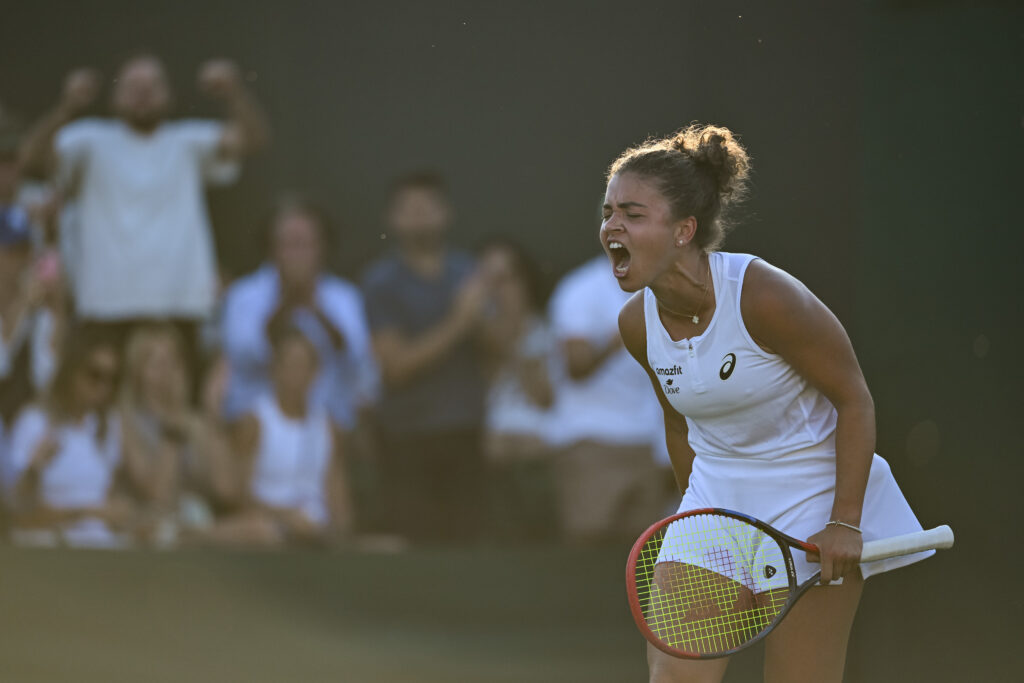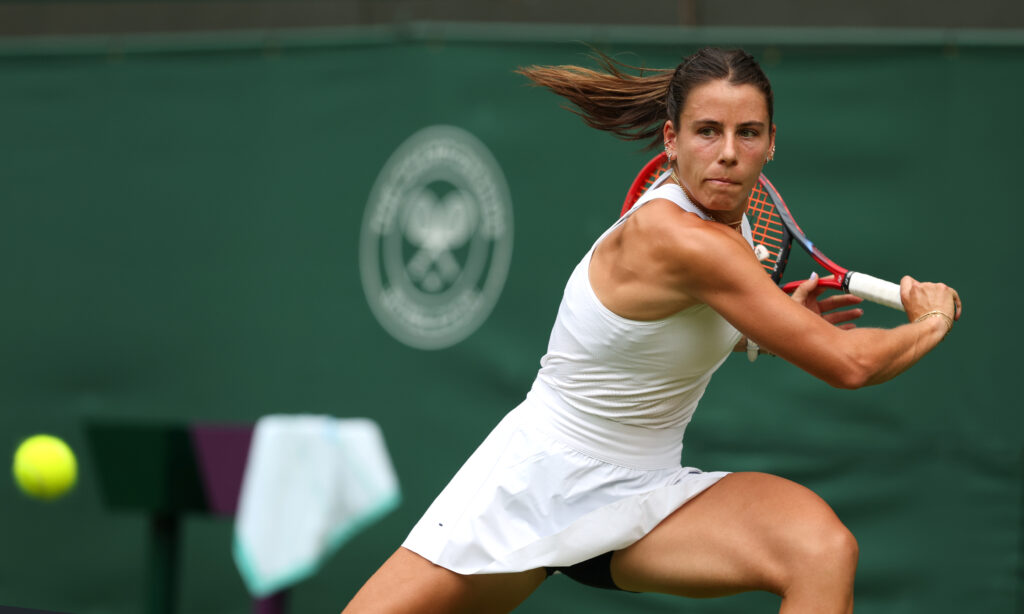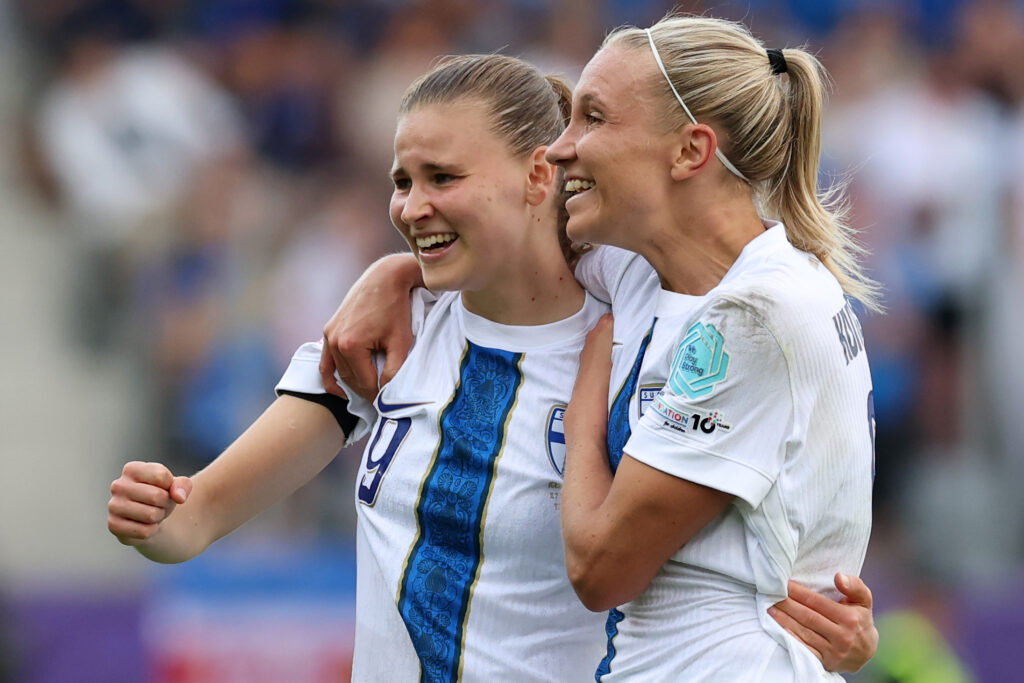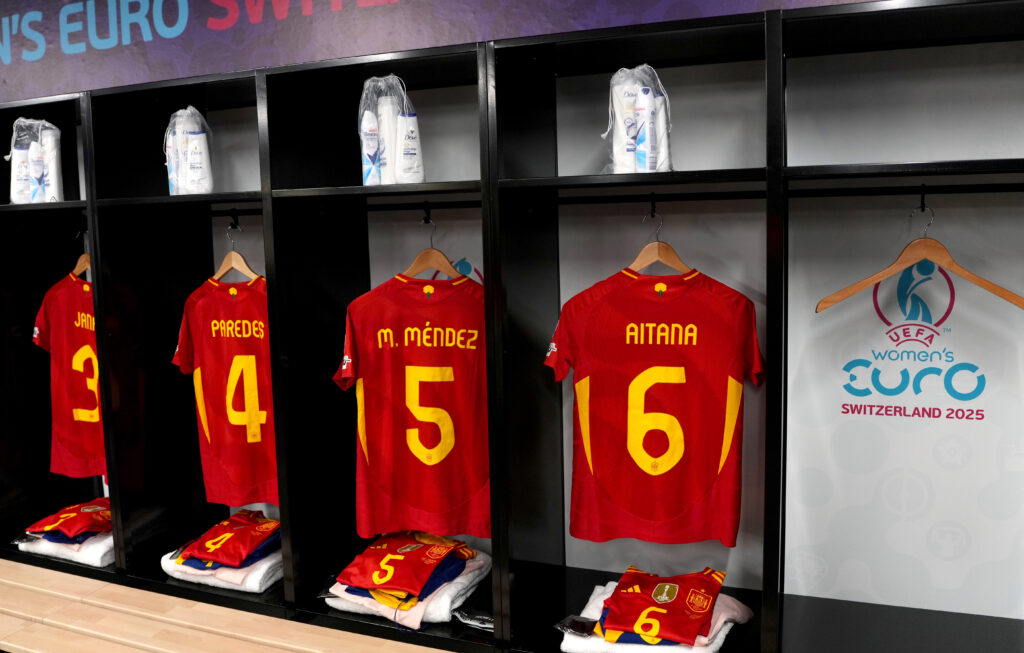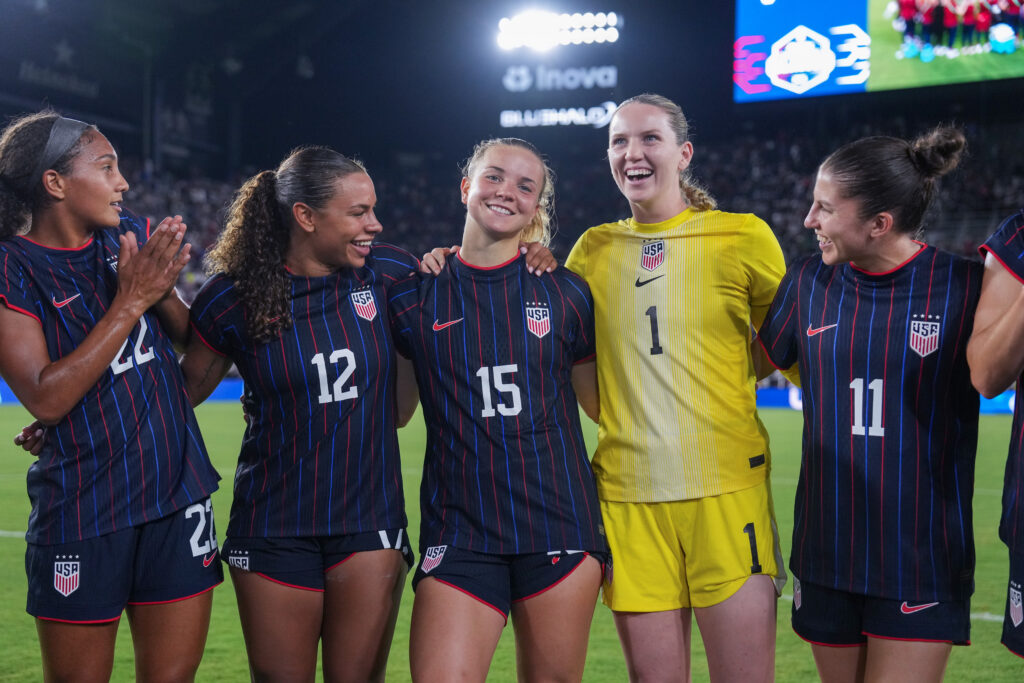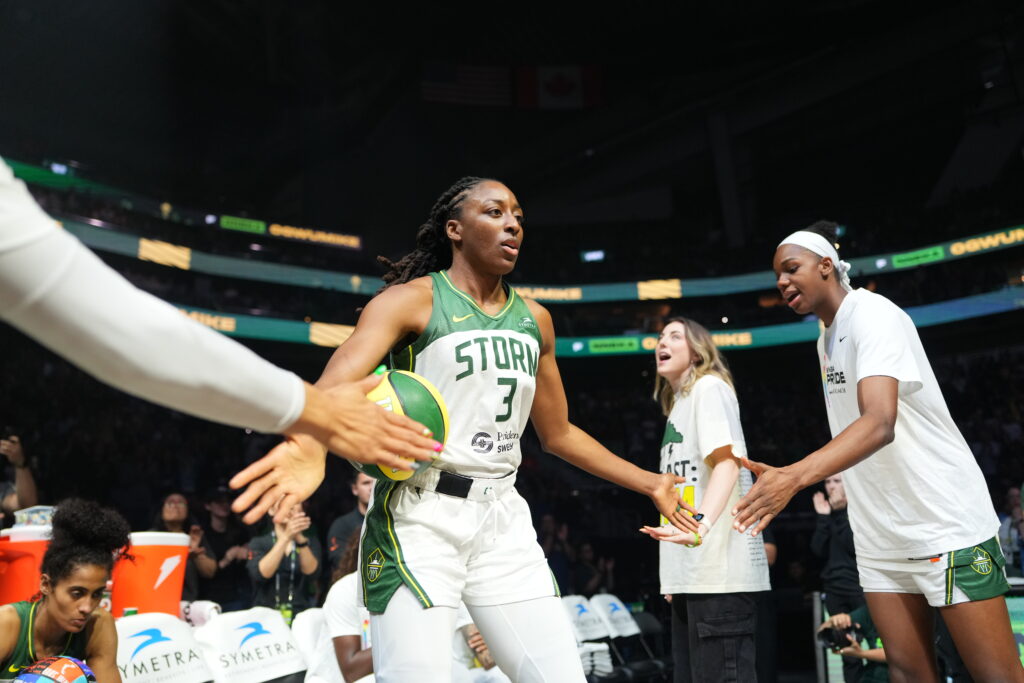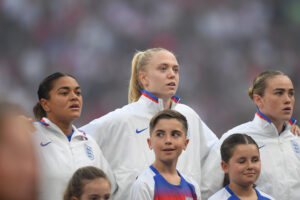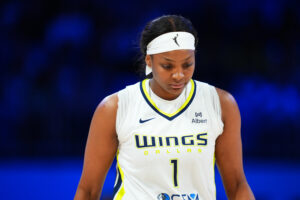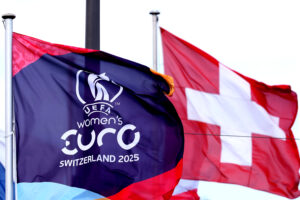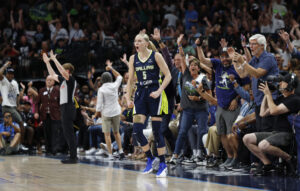The whispers in the hallway, the lonely bus rides to and from meets, the exhaustion from the burden of it all — for the first girls who dared to become wrestlers, these shared experiences made it rather difficult for them to imagine they were the pioneers of what is now the fastest-growing high school sport.
In 1990, a little more than 100 girls across the country competed in high school wrestling. The concept of a wrestling team composed entirely of girls was implausible, and the only opportunities to participate were with the boys. Stereotypes made it even more difficult. Not only was there a physical disadvantage when competing against boys, but also a cultural one — much of society wasn’t ready to accept that women could train and compete in a machismo sport like wrestling.
But that stigma couldn’t slow down the movement.
According to the National Wrestling Coaches Association, there are now approximately 34,000 girls and over 6,000 teams in the U.S. participating in wrestling at the high school level. Year after year, those numbers have continued to boom, and with 36 states now recognizing girls wrestling as a sanctioned sport, it shows no signs of slowing down.
The growth has also reached the college level, where the number of women’s teams stands at 120 with 1,462 participants. In September 2021, the University of Iowa became the first Power Five conference institution to offer women’s wrestling, and they’re set to begin competing in 2023-24.
NWCA Executive Director Mike Moyer believes the success in growing the sport can be attributed to visibility created at the Olympic level, as well as from coaches who have championed the movement at the scholastic and intercollegiate levels. He also credits organizations like the one he serves as a key to the swell.
“The NWCA has been very successful in helping to add 120 intercollegiate women’s wrestling programs across the nation, and those opportunities have helped to inspire many young girls to enter our sport,” Moyer says. “We also have a lot of other affiliated organizations in our sport that work well together to grow our sport.”

With each year that passes, it seems a new wrestling milestone is set. In 2001, at West Virginia’s Class AA-A state tournament, Erica Dyes fell just short of becoming the first girl to win a state title, becoming instead the first girl to finish second in a boys competition. Deanna Rix of Maine (2005) and Alyssa Lampe of Wisconsin (2006) later matched that feat before Michaela Hutchison of Alaska became the first girl to claim a title against boys, winning the 103-pound crown in 2006.
Then there was Clarissa Chun, who in 1998 became the first high school champion at the first girls state tournament in Hawaii in the 98-pound weight class. Chun went on to be crowned a world champion in freestyle wrestling in 2008 before claiming a bronze medal at the 2012 Olympics. She was an assistant coach for the USA Wrestling women’s national team from 2017-21, and on Nov. 18, 2021 she was named the inaugural coach of Iowa’s women’s program.
Stories of the early pioneers in women’s wrestling are not forgotten, while advocates of the sport continue to strive for equal representation. The sport has made many strides in recent years, but the fact remains that 16 states and territories have yet to sanction girls wrestling at the high school level.
For many, the fight continues.

‘Girls can wrestle, too’
It’s a typical summer for Annaliese Witmer in her hometown of Bellefonte, Pa., where she can finally decompress and enjoy her time away from the classroom. Annaliese is no different than her classmates in that she’s not bound by her textbooks and homework during these warmer months. The summer allows her time to swim and play her ukulele, but more importantly, she’s able to focus on what she’s grown to love the most in recent years: amateur wrestling.
Annaliese will be a junior when the school year begins in late August but is still buzzing from a sophomore year in which she joined her school’s student newspaper, Bellefonte’s Red & White, and fully immersed herself in journalism.
Bellefonte is a central Pennsylvania borough with a population of a little more than 6,000, and it sits just 15 minutes northeast of State College, where Annaliese’s mother and father attended college at Penn State and got engaged at Beaver Stadium. Wrestling has always been a part of her life. Her father, Brian, wrestled a little bit during his high school years, but he’s always held onto his fandom.
Annaliese’s older brother, Zack, was a four-time letter winner in wrestling at Saint Joseph’s Catholic Academy in nearby Boalsburg, where he had a 116-21 record and was a team captain, before enrolling at Columbia College in New York. Zack is a member of the school’s wrestling team and is entering his sophomore season.
“When my brother was growing up, my dad would take him to Penn State wrestling matches when he was still in diapers,” Annaliese says. “When he was 2, he started wrestling, and he’s been wrestling ever since.”
Annaliese admits she always dreaded having to spend every weekend watching her brother compete in tournaments, but by the time she was 14, she had developed a love for the sport. Right around then, she had realized girls could wrestle, too.
Remember why you started and never forget how far you have come. pic.twitter.com/oAaPzR2Zyw
— Annaliese Witmer (@AnnalieseWitmer) February 8, 2022
Annaliese recalls one particular tournament last fall, the Super 32 Challenge, in which the girls’ results from the national event weren’t posted, and it never sat right with her.
“That’s when I was like, ‘Hey, I need to give girls wrestling some attention. Nobody else is going to,’” she says.
With the help of her brother, Annaliese set out to write an article on girls wrestling. She was able to get in touch with Emma Randall, an assistant coach for the 2016 women’s Olympic team who had recently taken a position as head coach at the New York City Regional Training Center.
“I didn’t know who she was until I started doing research on who I was going to be interviewing, and I was like, ‘Holy crap,’” Annaliese says.
Along with Randall, Annaliese also interviewed Grace Stem, who competed for the U.S. in the women’s freestyle at the 2021 Cadet European Championships, and Ava Bayless, a fellow “wrestling sister” she knew through local circles but has since signed a National Letter of Intent with Iowa. The result was a 1,325-word article published on Dec. 2, 2021 in Bellefonte’s Red & White, titled “Girls Can Wrestle Too.”
From that moment on, Annaliese’s confidence boomed. On New Year’s Eve, she launched a website of her own called Takedown Talk, devoted entirely to promoting girls and women in wrestling.
I am beyond exited to announce the launch of my new website! Takedown talk- a wrestling website striving to bridge the gab between men’s and woman’s wrestling! Check it out in the link below! https://t.co/EP130CcWUy
— Annaliese Witmer (@AnnalieseWitmer) January 1, 2022
“I wrote that first article for my school newspaper, and at that point I had zero followers on Twitter,” Annaliese says. “I never used Twitter in my life, so all the followers I have now — I think I have 400-something — have all been from my wrestling advocacy.
“It’s something I always thought about doing, like, ‘Oh, I want to make my own website about something I feel passionate about.’”
As soon as Annaliese started her Twitter account, she immediately began gaining followers from people interested in her advocacy through Takedown Talk. She even received a follow from Sally Roberts, a former combat sport veteran and sport psychology consultant who founded Wrestle Like a Girl, an organization focused on empowering girls and women through wrestling.
“I had a lot of help making the website,” says Annaliese, who also advocates for ADHD awareness through her website. “I reached out to a lot of people who have done it before me and kind of asked for their advice, like ‘Hey, would you actually read my content? Is this something people would actually be interested in?’
“I made the website and thought it was going to be for fun. I never thought I’d be sitting in this position today.”
Pennsylvania is one of 16 states and territories that have yet to sanction girls wrestling, though it has been granted Emerging Sport Status by the Pennsylvania Interscholastic Athletic Association, meaning that it’s on track to be a fully sponsored sport as soon as 100 teams are formed. There are currently 54 schools in the state that have approved a girls wrestling program.
But within just a year’s time, the sport has seen exponential growth in Pennsylvania — Annaliese recalls reading an article in mid-June of 2021 when there were only 11 programs. She has worked closely with the nonprofit organization SanctionPA to help increase wrestling opportunities for girls across the state.
For Annaliese, the advocacy starts in her own community, as Bellefonte itself has yet to sanction girls wrestling. She’s spoken to the school’s athletic director about starting a program, but the fact that there are currently no girls competing on the boys team has kept the school from attempting to establish a program of its own.
“I feel like there’s always been girls who have wanted to wrestle and have wrestled, but it’s just now getting popular because girls know they can wrestle,” Annaliese says. “If you look at Pennsylvania, when I was growing up there were maybe two girls, if that, in the whole state who wrestled. There weren’t very many.
“Now there’s over 500 in my state alone, and I think that’s probably because when these schools have wrestling teams, girls start wrestling.”
Thanks to Title IX, Ballard couldn’t turn her away
It was a difficult story for Aymi Paradise-Flores to recount, but she knew it needed to be told.
Aymi took the stage in late April to share her story from three decades prior as part of the Des Moines Storytellers Project, a series of events in which community members worked with Des Moines Register journalists to tell first-person stories live on stage.
Her story began in rural Iowa. Aymi’s father, Arvin Foell, was a second-degree black belt in judo who taught at a studio in Fort Dodge, and Aymi was excited to be like her father. She began practicing judo when she was a kindergartener, learning first how to fall. She would curve like a roly poly, tuck her chin, drop from standing, spread her arms like an eagle and slap the mat.

Some of her earliest memories involved going to her father’s judo tournaments. One in particular stands out from an event in Omaha, Neb., where Arvin broke his arm but still won. He received his trophy with a bloody cloth around the figure’s arm.
That embodied the kind of toughness instilled in Arvin at a young age. As a teenager, he worked at a granary at night and went to school during the day, eventually becoming the first in his family to go to college and one of a few to complete high school. He attended Iowa State, where he met his wife, Jeanne, at a plant pathology lab as work-study students. Together, they had four children, the oldest of whom was Aymi.
Arvin was a pig farmer whose job required the family to move to various small towns across northern Iowa before they eventually landed in Huxley, a small town in the center of a trio of other small towns — Slater, Cambridge and Kelley — that made up Ballard High School.
When Aymi was in middle school, she found herself falling into a bad habit on a regular basis — she would come home, take a nap, eat junk food, take a nap again and then stay up all night doing homework — so in seventh grade, she begged her dad to practice judo again.
“I wanted to really be more powerful again, and it was a good connection with my dad,” Aymi says. “When we would go, we’d get that one-on-one time.”
Master Yong Chin Pak was the head instructor at the Iowa State Judo Club, where Aymi and Arvin trained. For Arvin, judo was a way for him to manage his anger, and Aymi eventually practiced it for the same reason. By the time she was 13, Aymi was the only non-college kid in the club, and in the summer of 1988, she and her father both took home gold at the Iowa Games.

A couple of years later, Aymi found herself falling back into the same bad habit from several years prior. She longed for the camaraderie and connection she found in judo, so in 10th grade, she discovered wrestling.
It seemed like an ideal fit, but there was one problem — not only was a girls team non-existent at Ballard, there were no girls wrestling at all. In fact, Iowa only had two girls wrestling in the entire state at the time, and Ballard had never had a female wrestler.
That all changed with Aymi, and thanks to Title IX, Ballard couldn’t turn her away.
The principal and coaches at Ballard were worried Aymi would get hurt, but Arvin never shared those same concerns.
“I’d just have those conversations with my dad at a time when it’s not easy to have conversations, and my father and I have kind of always been really similar and really close. So that makes things both hard and easy,” Aymi says. “Judo and wrestling had both been avenues to connect with my dad, especially through my teenage years when words were really hard to make work. In fact, a lot of times in my teenage years, I remember writing letters to my dad because I felt like I could never get out the right words.
“Wrestling and judo was that other language that we shared.”
Aymi still remembers her first pin at practice. She’d been working on her technique for months, as well as her conditioning and weightlifting. The teammate she wrestled that day assumed it was his lucky day, and while he was focused on the wrong kind of moves, Aymi was fixated on defeating her opponent. First she tried to pick his ankle, and then she went for a double-leg dive. To no avail, she dove into the fireman’s carry, lifted him over her shoulder and brought him to the mat for a pin.
The next day, that same teammate told the other kids at school that he let her win because he felt her up, and just like that, one of the most memorable moments of Aymi’s young wrestling career was tainted by a boy who was too insecure to admit defeat to a girl.
Despite several allies on the team, they were still few and far between. Matches were repeatedly forfeited because her opponents refused to wrestle a girl, and most of her teammates pretended like she didn’t even exist. She dressed in the locker room with cheerleaders, and on bus rides to and from road meets, Aymi often sat by herself at the front of the bus.
Then there was the reaction from those outside of her school in Huxley, where many didn’t believe she should be wrestling at all. Aymi heard the speculation and innuendo about her wrestling with the boys, and her decision to join the team even led to her father’s removal as a deacon at the family’s church, with longtime friends denouncing him on the basis of allowing his daughter to wrestle boys.
“I think in the end it demoralized and traumatized me more than I realized, but I think I internalized and kept going on and put up that face of pretending like it didn’t demoralize me as much as it did on the inside,” Aymi says. “It’s your game face. It was almost like it was still a competition all the time. I think that’s what it was more than anything.
“I just wasn’t going to give up, and I wasn’t going to give in to a lot of those pressures. Wrestling is not an easy sport, and it’s constant conditioning. You’re constantly pushing your own limits. I wasn’t in it for all the reasons people thought I was.”

Amid all the assumptions about why Aymi had taken up the sport, it was as if no one ever bothered to ask her why she was there.
She did it to prove to herself that she could do it and push herself to limits she didn’t know she could achieve. The more people didn’t want her there, the more Aymi wanted to stay. Even her father told her later on that he didn’t think she’d last a week.
She lasted two years.
“I got my letter that first year, and I feel like that’s what they thought I was in it for, too, a different recognition,” Aymi says. “That’s why I went out for a second year because it was never about that either. It wasn’t about just getting that letter, and knowing that wasn’t a real letter — I won that letter because of forfeits — it always felt disingenuous or like some sort of token.
“It was about being able to keep going when no one wants you to keep going but you, so I’ve come back to that theme a lot of times in my life and in a lot of different situations.”
Although she never won a match, it was never about the wins and losses for Aymi, but she still found reason to celebrate her successes, even the small ones. She speaks with confidence in being distinguished as Ballard’s first female wrestler, and much like her father, she knows she can weather any storm she faces.
Aymi’s experiences are rooted in a lonely, alienated place, but she emerges stronger than ever before. Through it all, she’s learned to be empathetic, persistent and resilient.
Nowadays, she’s a credit recovery flex teacher and debate and speech head coach at Hoover High School in Des Moines, and as she looks back on her journey at Ballard, Aymi recognizes it as something much larger than her own. She paved the way for future girls to push the limit in a male-dominated sport, including her sister, who joined Ballard’s team just several years after Aymi.
A mere two weeks before Aymi told her story in Des Moines, Ballard voted to create a girls wrestling team, and Aymi’s no longer ashamed to disguise the identity she’s been hiding since changing her name.
It’s the story of Amy Foell — pronounced “fell” — Ballard’s first female wrestler, Class of 1994.
“Now there’s a place to go with those kinds of skills,” Aymi says. “There was no place to go with those skills when I was doing it. That’s why I admire it now.
“This is why this story was important to tell now.”
Leveling the playing field
Since 2004, women’s wrestling has been recognized as an Olympic sport, providing exposure that had previously been unattainable. That same year, Patricia Miranda claimed the first medal for the U.S. when she won bronze at 48 kg, while Sara McMann became the first U.S. woman Olympic finalist, winning silver at 62 kg.
Then, in 2016, Helen Maroulis became the first U.S. woman to win a gold medal in women’s freestyle wrestling when she defeated three-time Olympic champion Saori Yoshida of Japan in the finals in Rio de Janeiro.

Moyer dedicates a large part of his routine every day to speaking with college administrators about the importance of adding women’s wrestling. In many cases, the NWCA helps to raise startup funds for new programs and provide full scholarships for women’s college coaches and high school coaches aiming to transition to the next level, allowing them to attend a comprehensive CEO Leadership Academy where the goal is to strengthen their CEO skills.
The focus is on things like recruiting, retention, fundraising and branding, and the NWCA also has a dedicated administrator to help support new programs as they are established.
“At the high school level, we have a modified version of the CEO academy that is uniquely designed to help scholastic coaches become better at recruitment, retention and other skills necessary to sustain girls programs,” Moyer says. “We also advocate vigorously with all of the collegiate and scholastic governing bodies to embrace girls/women’s wrestling.”
For the advocates, the mission doesn’t end until the playing field is equal.
In Bellefonte alone, there are no clubs within a two-hour radius for girls to wrestle, according to Annaliese. There’s also the issue of gaining access to necessary gear — things like shoes and singlets aren’t readily available for girls to find. While she’s happy with the progress that’s been made, Annaliese knows there’s still more work to be done.
“The growth has been amazing that I’ve seen so far in my lifetime,” she says, “but I don’t think I’ll ever be fully satisfied until it is even with the boys, until we get equal media coverage and have as many opportunities as the boys because we still do have a lack of opportunities.”
The debate over trans inclusion in sports was one that weighed heavy on Aymi’s mind as she prepared to tell her story in April. She compares it to her own battle for inclusion three decades prior.
“I was like, ‘You know what? Twenty years ago, they didn’t want you on their team either, so how dare you keep someone else out who wants to be there,’” Aymi says. “I think that, more than anything, is what prompted me. These girls just don’t know.
“It wasn’t just an option that you could sign up for. It wasn’t OK. People didn’t want you there.”

Aymi still sees the sexism entrenched at a generational level as she recalls a heartbreaking moment in which her daughter was playing flag football in first grade, and a boy on that team told her, “Girls don’t play football.”
“She was too sad and embarrassed and never went back,” Aymi says while holding back tears. “It still happens, and that was like two years ago. That’s what needs to change, the attitude that certain sports are for boys or girls instead of it just being a sport.”
Attitudes surrounding the sport are barriers that continue to stymie progress. While advocates believe it’s important to celebrate the progress, it’s still not enough.
What comforts Aymi is knowing there are others out there who are just like her, early pioneers who dared to challenge the norm. She also takes great pride in being someone who helped start that conversation among her generation — many of whom are now parents and, in some cases, grandparents of the next generation.
“I think that just even seeing that possibility changed the way they allowed their children to interact in sports,” Aymi says. “I think that’s what’s been the biggest legacy, not necessarily my journey, but the exposure and seeing that it’s possible and seeing that, ‘Oh, she got beat her first time and never came back.’
“No, I kept coming back for more and more.”
Trent Singer is the High School Editor at Just Women’s Sports. Follow him on Twitter @trentsinger.
